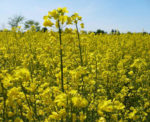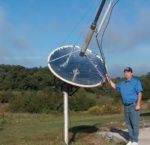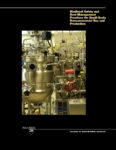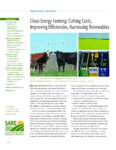The educational materials listed on this page are about Bioenergy and Biofuels.
A biofuel is produced through biological processes, such as agriculture and anaerobic digestion, rather than a fuel produced by geological processes, such as coal and petroleum, from prehistoric biological matter. Biomass, unlike other renewable energy, can be converted into liquid biofuels to help meet transportation fuel needs. You may have heard this type of fuel referred to as biogas or bioenergy. The two most common types of biofuels in use today are ethanol, sometimes called e85 gas, and biodiesel. Ethanol fuel, or e85 fuel, is a product of agriculture and comes from corn. Biomass energy can also be derived indirectly from agricultural, commercial, domestic, or industrial wastes to create biomass fuel. Key practices include agronomic crops as byproduct utilization, bioenergy and biofuels, anaerobic digestion, biodiesel, biofuel feedstocks, nutrient cycling, municipal wastes, renewable energy.
The SARE bulletin Clean Energy Farming: Cutting Costs, Improving Efficiencies, Harnessing Renewables shows farmers ways to utilize clean energy practices on their operations, whether large or small. This will help farmers learn ways to implement farming practices that both save energy and protect natural resources, and produce and use renewable fuels. SARE’s book, Building a Sustainable Business, guides producers who want to build a sustainable and profitable business plan to include renewable energy and biofuel options. The Farm Energy Topic Room provides a wealth of information on clean energy topics, including biodiesel, farm energy audits, solar and wind energy, and more.
Showing 1-17 of 17 results
Northeast Farm Energy IQ
Farm Energy IQ offers free information to help farmers enhance operational sustainability in the context of the farm economy and ecosystem.
Climate Change and Sustainable Agriculture: Curriculum and Handbook
To help educate farmers and agricultural professionals on climate change and agriculture topics, Julie Doll and a team of researchers at the Kellogg Biological Station have developed a handbook and a curriculum as products of a NCR-SARE Professional Development Program grant.

Sustainable Production and Use of On-Farm Energy
Using solar or wind energy or producing biofuels from crop feedstocks and anaerobic digestion helps farmers achieve energy independence while improving profitability and reducing fossil fuel emissions.

From Fruit to Fuel
As tree fruit growers know well, annual harvests do not remove all the fruit from the orchard. A great deal is left behind littering the orchard floor. While pondering his fruit waste problem, Dan West of Macon, Mo., who grows apples, peaches, apricots, nectarines, plums and pears, hit upon a novel approach: Why not turn […]

The Sustainability of Biofuel Fact Sheet Series
This 18-part series addresses topics related to the sustainability of biofuel production, including biodiversity, greenhouse gas reductions, life cycle analysis and more.
Exploring Energy Efficiency and Alternatives Curriculum
According to Sarah Hamlen, Montana State University Extension, and Milton Grieger, University of Wyoming Extension, Western producers’ profitability is closely linked to the consumption and production of energy resources. Decisions made by these producers on energy issues have long-term implications for the sustainability of agricultural production, they assert. To increase producers’ knowledge of energy issues, […]
Impact of Biomass Removal for Bioenergy
The rapid increase in ethanol production from corn rain, and the proposed use of crop residues for ethanol production poses significant challenges in increasing awareness and providing needed training to extension educators and agency staff to address the potential environmental impacts of intensive corn production and corn residue use. Mahdi Al-Kaisi conducted an educational training […]
Greenhouse Energy Conservation Strategies and Alternative Fuels
Many greenhouse growers are looking for options to reduce their energy costs, but they don’t always understand which options will provide the greatest return on investment. For his project, Scott Sanford developed curriculum materials, extension bulletins, resource lists, and a spreadsheet model for educators to use for delivering programming on energy management and conservation for […]

Biofuels and Community Participation
Extension and other natural resource educators can provide educational programming on renewable energy and potential impacts at the community level, and can be facilitators of community discussions about renewable energy. Sharon Lezberg provided training materials to approximately 100 extension, NRCS educators, and community stakeholders on ways to engage community members and stakeholders in assessing proposed bioenergy developments. The toolkit Lezburg developed provides a decision-making […]

Growing Biodiesel Crops: A Couple of Tips
In this short video, Rainville describes his philosophy for trying something new on your farm. It’s all about making the most of the learning curve.
Storage Methods for Ethanol Co-Products
This University of Nebraska video series contains information on the storage and utilization of three unique co-product feeds from the ethanol industry.

Energy Independence: On-Farm Biodiesel Fuel Production
Roger Rainville is ahead of the curve when it comes to reducing costs on his farm near Alburgh, Vt. He’s currently producing biodiesel from canola and sunflower for about $1.70 a gallon.
Greenhouse Energy Conservation Strategies and Alternative Fuels
Includes curriculum materials, extension bulletins, resource lists, and a greenhouse energy model that were developed with the intention that educators can use the materials in full or part to deliver programming on energy management and conservation for greenhouse production.

Small-Scale Biogas Technology
This website has information on technology for turning organic waste into biogas for small-scale, on-farm energy applications.

Biodiesel Safety and Best Management Practices for Small-Scale Noncommercial Use and Production
This publication reviews some of the accepted practices associated with small-scale biodiesel production to make it a safe, environmentally sound practice that generates a quality product.

Clean Energy Farming
Clean Energy Farming: Cutting Costs, Improving Efficiencies, Harnessing Renewables features innovative SARE-funded research and examples of farmers who are improving energy efficiency while saving money, implementing farming practices that both save energy and protect natural resources, and producing and using renewable fuels.
GIS Applications in Agriculture: Nutrient Management for Improved Energy Efficiency Volume II
Provides an outline of how management recommendations are developed and how a ground-based active sensor can be used. It contains 24 case studies (exercises) ranging from using historical techniques to overcome production barrier to calculating soil organic carbon maintenance requirements. A CD containing data sets is included with the book.